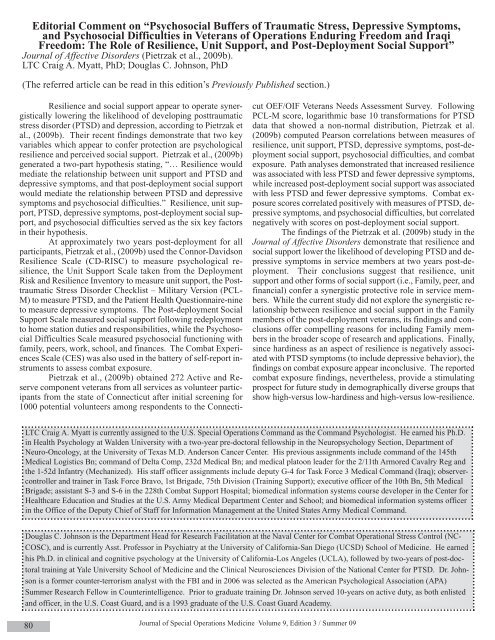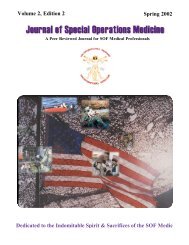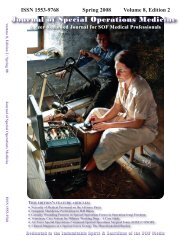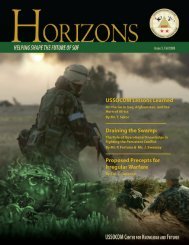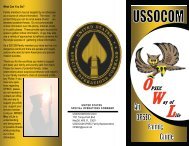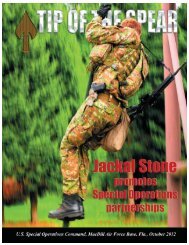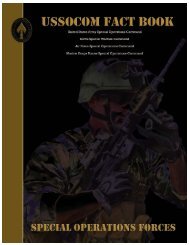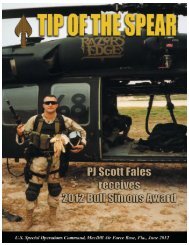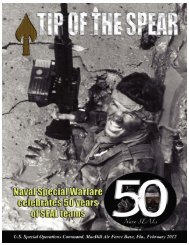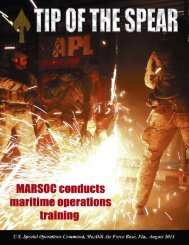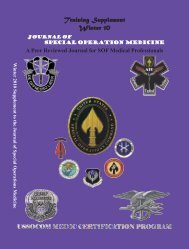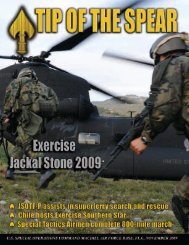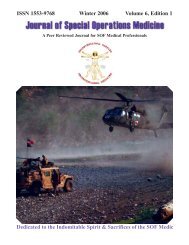Summer - United States Special Operations Command
Summer - United States Special Operations Command
Summer - United States Special Operations Command
You also want an ePaper? Increase the reach of your titles
YUMPU automatically turns print PDFs into web optimized ePapers that Google loves.
Editorial Comment on “Psychosocial Buffers of Traumatic Stress, Depressive Symptoms,and Psychosocial Difficulties in Veterans of <strong>Operations</strong> Enduring Freedom and IraqiFreedom: The Role of Resilience, Unit Support, and Post-Deployment Social Support”Journal of Affective Disorders (Pietrzak et al., 2009b).LTC Craig A. Myatt, PhD; Douglas C. Johnson, PhD(The referred article can be read in this edition’s Previously Published section.)Resilience and social support appear to operate synergisticallylowering the likelihood of developing posttraumaticstress disorder (PTSD) and depression, according to Pietrzak etal., (2009b). Their recent findings demonstrate that two keyvariables which appear to confer protection are psychologicalresilience and perceived social support. Pietrzak et al., (2009b)generated a two-part hypothesis stating, “… Resilience wouldmediate the relationship between unit support and PTSD anddepressive symptoms, and that post-deployment social supportwould mediate the relationship between PTSD and depressivesymptoms and psychosocial difficulties.” Resilience, unit support,PTSD, depressive symptoms, post-deployment social support,and psychosocial difficulties served as the six key factorsin their hypothesis.At approximately two years post-deployment for allparticipants, Pietrzak et al., (2009b) used the Connor-DavidsonResilience Scale (CD-RISC) to measure psychological resilience,the Unit Support Scale taken from the DeploymentRisk and Resilience Inventory to measure unit support, the PosttraumaticStress Disorder Checklist – Military Version (PCL-M) to measure PTSD, and the Patient Health Questionnaire-nineto measure depressive symptoms. The Post-deployment SocialSupport Scale measured social support following redeploymentto home station duties and responsibilities, while the PsychosocialDifficulties Scale measured psychosocial functioning withfamily, peers, work, school, and finances. The Combat ExperiencesScale (CES) was also used in the battery of self-report instrumentsto assess combat exposure.Pietrzak et al., (2009b) obtained 272 Active and Reservecomponent veterans from all services as volunteer participantsfrom the state of Connecticut after initial screening for1000 potential volunteers among respondents to the ConnecticutOEF/OIF Veterans Needs Assessment Survey. FollowingPCL-M score, logarithmic base 10 transformations for PTSDdata that showed a non-normal distribution, Pietrzak et al.(2009b) computed Pearson correlations between measures ofresilience, unit support, PTSD, depressive symptoms, post-deploymentsocial support, psychosocial difficulties, and combatexposure. Path analyses demonstrated that increased resiliencewas associated with less PTSD and fewer depressive symptoms,while increased post-deployment social support was associatedwith less PTSD and fewer depressive symptoms. Combat exposurescores correlated positively with measures of PTSD, depressivesymptoms, and psychosocial difficulties, but correlatednegatively with scores on post-deployment social support.The findings of the Pietrzak et al. (2009b) study in theJournal of Affective Disorders demonstrate that resilience andsocial support lower the likelihood of developing PTSD and depressivesymptoms in service members at two years post-deployment.Their conclusions suggest that resilience, unitsupport and other forms of social support (i.e., Family, peer, andfinancial) confer a synergistic protective role in service members.While the current study did not explore the synergistic relationshipbetween resilience and social support in the Familymembers of the post-deployment veterans, its findings and conclusionsoffer compelling reasons for including Family membersin the broader scope of research and applications. Finally,since hardiness as an aspect of resilience is negatively associatedwith PTSD symptoms (to include depressive behavior), thefindings on combat exposure appear inconclusive. The reportedcombat exposure findings, nevertheless, provide a stimulatingprospect for future study in demographically diverse groups thatshow high-versus low-hardiness and high-versus low-resilience.LTC Craig A. Myatt is currently assigned to the U.S. <strong>Special</strong> <strong>Operations</strong> <strong>Command</strong> as the <strong>Command</strong> Psychologist. He earned his Ph.D.in Health Psychology at Walden University with a two-year pre-doctoral fellowship in the Neuropsychology Section, Department ofNeuro-Oncology, at the University of Texas M.D. Anderson Cancer Center. His previous assignments include command of the 145thMedical Logistics Bn; command of Delta Comp, 232d Medical Bn; and medical platoon leader for the 2/11th Armored Cavalry Reg andthe 1-52d Infantry (Mechanized). His staff officer assignments include deputy G-4 for Task Force 3 Medical <strong>Command</strong> (Iraq); observercontrollerand trainer in Task Force Bravo, 1st Brigade, 75th Division (Training Support); executive officer of the 10th Bn, 5th MedicalBrigade; assistant S-3 and S-6 in the 228th Combat Support Hospital; biomedical information systems course developer in the Center forHealthcare Education and Studies at the U.S. Army Medical Department Center and School; and biomedical information systems officerin the Office of the Deputy Chief of Staff for Information Management at the <strong>United</strong> <strong>States</strong> Army Medical <strong>Command</strong>.Douglas C. Johnson is the Department Head for Research Facilitation at the Naval Center for Combat Operational Stress Control (NC-COSC), and is currently Asst. Professor in Psychiatry at the University of California-San Diego (UCSD) School of Medicine. He earnedhis Ph.D. in clinical and cognitive psychology at the University of California-Los Angeles (UCLA), followed by two-years of post-doctoraltraining at Yale University School of Medicine and the Clinical Neurosciences Division of the National Center for PTSD. Dr. Johnsonis a former counter-terrorism analyst with the FBI and in 2006 was selected as the American Psychological Association (APA)<strong>Summer</strong> Research Fellow in Counterintelligence. Prior to graduate training Dr. Johnson served 10-years on active duty, as both enlistedand officer, in the U.S. Coast Guard, and is a 1993 graduate of the U.S. Coast Guard Academy.80Journal of <strong>Special</strong> <strong>Operations</strong> Medicine Volume 9, Edition 3 / <strong>Summer</strong> 09


